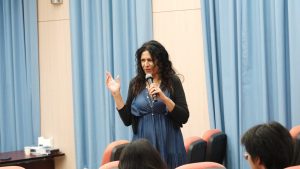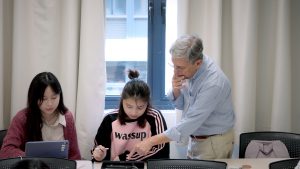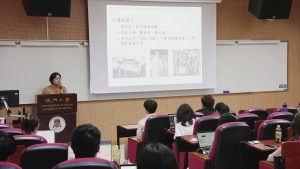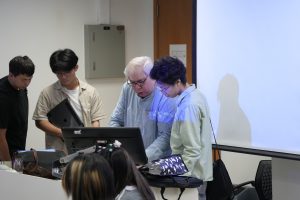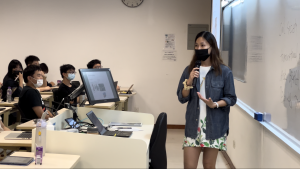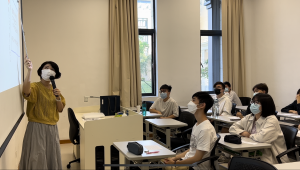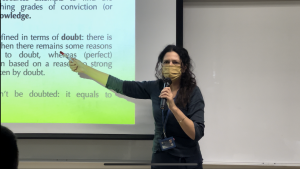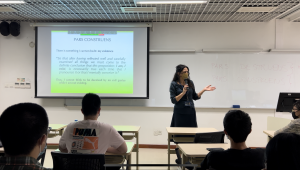人文學院精品課程
為響應學院五年計劃、樹立良好的教學模範、提升教與學的績效及總體教學質量,人文學院打造了一系列精品課程。
人文學院精品課程旨在幫助學生培養各項技能,包括批判性思維、獨立思考、文化意識及解決問題等能力。通過修讀這些課程,學生獲得專業課程外的知識及統合能力,更能與自身專業的知識架構牢固結合,培養出他們日後的能多面發展的能力。這也是澳大一直秉持全人教育的核心部分。
舉例說明,“澳門歷史”能讓學生了解他們所生活和學習的這座城市,歷史文化來源從而對澳門社會有更深入的理解。“納粹大屠殺、種族清洗與人權” 能讓學生深入人類最黑暗的深處,探討是什麼決定了人類的殘忍和權力傾向,並向學生介紹現代歷史上的關鍵事件。這些課程旨在讓學生通過修讀一系列人文學科培養學生協同學習的能力、鼓勵學生分享自己的所思所想、提高批判性思考技能,同時獲得人文教育的核心知識。同理心、專業和發展多元視角等多方面技能。
| Course Code | Course Title | Course Description |
| EELC2010 | Academic English: Project-based learning | This is a one-semester Academic English course for students with an intermediate English language level. Students have three class hours every week. The course requires students to apply the skills they have learned in University English or Academic English course(s). In groups, students will learn to use introductory academic writing and speaking skills to design and implement their multigenre/multimodal projects. These skills include: primary/secondary research, critical thinking skills, problem-solving skills, writing/presentation skills, teamwork, etc. Through experiential learning, students will be guided to observe, collect information, persuade, and generate a writing/speaking product. |
| ENGL3014 | World Englishes | This course will introduce students to the study of contemporary and historical varieties of English worldwide. The pluralistic status of English varieties as well as the nature and effect of standards and standardizing varieties will be emphasized. The course may include historical approaches to varieties, geographical approaches or an approach that focuses on several recurring themes of how English is used internationally. |
| ENGL3030 | Shakespeare | This course is designed to give students an opportunity to explore a range of Shakespeare’s plays through which they can learn to appreciate the thematic and linguistic richness of the playwright’s works. Selected plays will be studied in connection with the theatrical and cultural backgrounds of Elizabethan England. Students will also be familiarized with schools of Shakespearean criticism in the 20th- and 21st-centuries. In addition, the class will read selected sonnets and narrative poems. |
| ENGL3046 | Conference Interpreting | This course aims to train learners in Conference Interpreting between English and Chinese. The course involves intensive practice in Listening, Comprehension, Shadowing and Paraphrasing leading to rendering in simultaneous mode. Texts will be selected from a variety of fields and genres to enrich understanding and vocabulary. Simulated conference sessions will acquaint learners with actual working conditions, booth etiquette and techniques used in Simultaneous Interpreting. Through selected readings and presentations learners will acquire a better understanding of the subject of Interpreting in general and Conference Interpreting in particular. |
| GELH1001 | Chinese Languages and Chinese Communities | In this course the students expand their knowledge of Chinese languages and Chinese communities and understand language phenomena as an expression of culture and as a function of society. Through readings, discussions and mini-projects the students apply the sociolinguistics knowledge introduced to answer academic and practical questions. Global and local language situations are surveyed in a Chinese perspective and current issues in language matters are analyzed. Through problem-solving exercises, the students hone their skills of critical thinking, communication and collaboration. |
| GELH2002 | The Holocaust, Genocide and Human Rights | This course introduces students to the Holocaust, the systematic murder of the Jews of Europe by the Nazi regime between the years 1939 and 1945. In seeking to understand how the Holocaust happened, students will be introduced first to concepts like racial prejudice and other forms of discrimination, anti-Semitism, and the role of nationalism in creating concepts of the Other. The course will study the rise of the Nazi Party in Weimar Germany, its accession to power in 1933 and the systematic denigration of, and discrimination against, Jews from the years 1933 to 1939. The course will discuss the power of propaganda, the effects of discriminatory laws excluding Jews from all areas of public life and how these lead first to the mass murder of Jews in eastern Europe (Operation Barbarossa) and then the Final Solution, with the establishment of death camps, of which Auschwitz-Birkenau is but the most infamous. This course will also address the issue of genocide, how the Holocaust lead to the concept of genocide, first described as such by Raphael Lemkin in 1943 and subsequent international treaties seeking to prevent further genocides. The course will look at other genocides, including Armenia, Cambodia, Rwanda, and Darfur. Special attention will also be paid to the Japanese invasion of China, the Nanjing Massacre and Unit 731 in Manchuria. |
| HIST1000 | History of Macao | This course introduces and examines the historical development of Macao since its founding in the 16th century. Apart from examining the political aspects of Macao’s history, students will study the social, economic, and cultural dimensions of the historical development of modern Macao over the past four centuries. |
| JAPN1000 | Practical Japanese I | This course aims to develop Japanese language ability in daily conversation, reading and writing. At the same time, it also introduces Japanese Studies, including basic cultural ideas that are needed in the acquisition of the language. At the end of this course, students will be able to acquire very basic conversation skills of Japanese. |
| PHIL1000 | Introduction to Western Philosophy | This course attempts to provide an encompassing introduction to philosophy by looking at some of the fundamental problems philosophers discuss in a number of different areas of Western philosophy, such as general metaphysics, ontology, epistemology, philosophy of mind, philosophy of religion, and ethics. The classic materials are selected to provide a basis for understanding some of the central debates within each of these fields. |
| PORT2006 | Oral Comprehension and Production Skills III | The main objective of this course is the development of oral skills in Portuguese through listening and production tasks from the preceding elementary proficiency level to a lower intermediary level. |
- Prof. Sheyla Schuvartz Zandonai, HIST1000
- Prof. Nevia Dolcini, PHIL1000
- Dr. Mário Nunes, PORT2006
- 張璟瑋教授, GELH1001
- PRof. Glenn Timmermans, GELH2001
- Ms. Miho Ando, JAPN1000
- Prof. Catherine C Chan, GEGA1000
- Prof. Catherine C Chan, GEGA1000
- Ms. Miho Ando, JAPN1000
- Prof. Nevia Dolcini, PHIL1000
- Prof. Nevia Dolcini, PHIL1000



